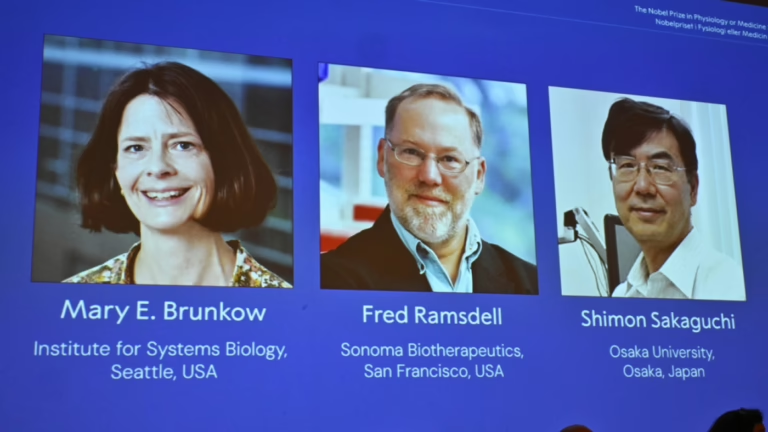Displayed are images of Mary E. Brunkow, Fred Ramsdell, and Shimon Sakaguchi, honored on Monday with the Nobel Prize in Medicine or Physiology at the Karolinska Institutet in Stockholm, Sweden.
Claudio Bresciani/TT News Agency
hide caption
toggle caption
Claudio Bresciani/TT News Agency
STOCKHOLM – The Nobel Prize in Medicine was awarded on Monday to Mary E. Brunkow, Fred Ramsdell, and Shimon Sakaguchi for their pioneering research on peripheral immune tolerance.
Currently, Brunkow serves as a senior program manager at the Institute for Systems Biology in Seattle, while Ramsdell acts as a scientific advisor at Sonoma Biotherapeutics in San Francisco. Sakaguchi holds a distinguished professorship at the Immunology Frontier Research Center at Osaka University in Japan.
Peripheral immune tolerance is a crucial biological mechanism that prevents the immune system from mistakenly attacking the body’s own cells, maintaining a balanced defense against harmful pathogens.
The foundation of their research began in 1995 when Sakaguchi identified a critical component of this immune regulation. Subsequent breakthroughs by Brunkow and Ramsdell in 2001, followed by Sakaguchi’s integrative work in 2003, collectively advanced the understanding of this field.
According to the Nobel Assembly, “The laureates’ findings have established the field of peripheral tolerance, catalyzing the creation of innovative therapies for cancer and autoimmune disorders. These insights also hold promise for improving organ transplantation outcomes, with several treatments currently in clinical trials.”
Thomas Perlmann, Secretary-General of the Nobel Committee, managed to contact Sakaguchi by phone on Monday morning, while leaving messages for Brunkow and Ramsdell.
This accolade marks the first announcement in the 2025 Nobel Prize series, revealed by the Karolinska Institute in Stockholm.
Last year’s Nobel Prize in Medicine was awarded jointly to Americans Victor Ambros and Gary Ruvkun for their discovery of microRNA-small genetic molecules that regulate gene expression by switching cellular functions on and off.
The Nobel Prize announcements will continue with the physics award on Tuesday, followed by chemistry on Wednesday, literature on Thursday, the Peace Prize on Friday, and the Nobel Memorial Prize in Economic Sciences on October 13.
The formal award ceremony is scheduled for December 10, commemorating the anniversary of Alfred Nobel’s death. Nobel, a Swedish industrialist and inventor of dynamite, established these prestigious prizes before his passing in 1896.

















